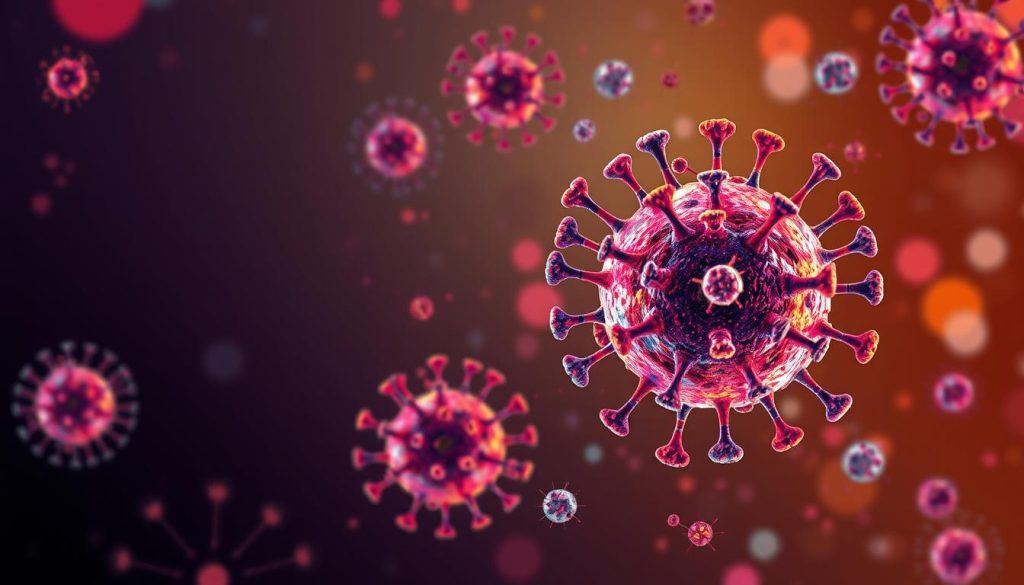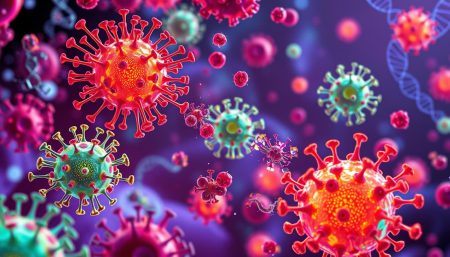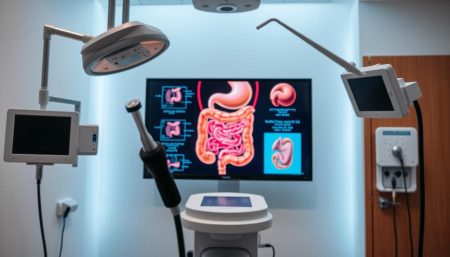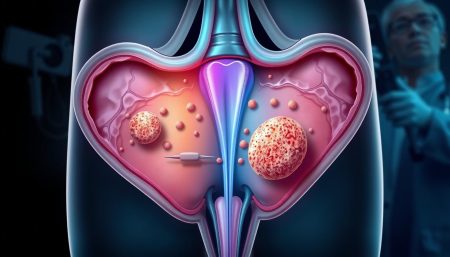When we talk about sexual health, a big question is whether anal sex can lead to cancer. This topic is sensitive and needs a careful approach. We want to share the facts in a way that’s both personal and scientifically accurate.
Medical science is always updating its knowledge on this topic. It’s important for everyone to have the latest and most detailed information. We aim to share the facts in a way that’s helpful and reassuring, without causing worry.
It’s important to talk about this topic without shame. We want to help people understand the facts about cancer and anal sex. This knowledge can help keep us healthy. So, let’s look at what research says about the link between certain sexual activities and cancer.
We’ll focus on the latest research and what it means for our health. This way, we can make informed choices about our well-being.
Key Takeaways
- The importance of discussing sexual health openly and responsibly in the context of cancer risks.
- An overview of the latest oncology research regarding anal sex and its potential connections to cancer.
- The necessity of separating myths from medical facts to support informed decisions regarding health.
- Insights into how current scientific understandings can guide preventive practices.
- Encouragement for readers to consider regular screenings and health check-ups as part of their wellness routine.
Understanding Sexual Health and Cancer Risks
Exploring sexual health shows how different sexual behavior can affect cancer prevention. It’s important to understand both biological factors and lifestyle choices. This helps address health risks linked to various sexual activities.
When talking about sexual health and cancer, it’s key to know the difference between correlation and causation. Some behaviors might be linked to higher cancer risks, but proving direct causes is harder. It needs careful scientific study.
As scientists learn more about sexual behavior and cancer risks, it’s vital for the public to stay informed. Knowing these links can help prevent cancer.
Being aware of cancer risk factors helps people make better choices about their sexual health. Here are some key points:
- How often and in what ways you have sex can change your cancer risk.
- STIs can increase the risk of certain cancers.
- Genetics and health history also play a big role in cancer risk.
Understanding these factors can lead to more effective cancer prevention. As research grows, we get more specific advice that fits our lifestyle and health.
| Aspect of Sexual Health | Relevance to Cancer Risk | Preventive Strategies |
|---|---|---|
| STI Prevention | Direct link to cervical, anal, and other cancers | Regular screenings, HPV vaccination |
| Genetic Predispositions | Enhanced risk based on family history | Genetic counseling and testing |
| Lifestyle Factors | Indirect effects through immune system efficacy | Healthy lifestyle choices, frequent medical check-ups |
In summary, staying informed about sexual behavior and its health effects is crucial. By combining scientific knowledge with preventive actions, we can lower cancer risks. This helps improve overall health.
Investigating the Link Between Anal Activity and Oncology
Oncology studies and sexual practices are closely linked. They help us understand how anal intercourse might increase cancer risks. By studying lifestyle choices, researchers aim to find out how they affect cancer rates.
Epidemiological Studies on Sexual Behavior and Cancer
Recent studies have focused on anal intercourse and cancer. They show how certain sexual behaviors might be linked to cancer. This research uses big data to find important connections.
| Study | Population | Cancer Type | Findings |
|---|---|---|---|
| Jones et al. | Adults 20-50 | Anal Cancer | Increased incidence in frequent practitioners |
| Smith Research Group | Adults 30-60 | Colon Cancer | Mild correlation to high-risk behaviours |
| Global Health Study | Varied | Multiple Types | Higher risk with presence of HPV |
Biological Mechanisms Potentially Connecting Anal Sex to Cancer
It’s important to understand how anal intercourse might lead to cancer. Researchers look at inflammation, immune response, and virus transmission. These factors could increase cancer risk.
These studies are crucial for public health and personal choices. They help us learn more about the link between sexual behavior and cancer. This knowledge can lead to better prevention and treatment options.
Examining Types of Cancer Potentially Associated with Anal Sex
It’s important to know about the cancers linked to anal sex. This helps us understand how our sexual choices affect our health. We’ll look at anal cancer and how HPV infections play a big role in it.
Anal Cancer: Incidence Rates and Causative Factors
Learning about anal cancer risks is key. Even though it’s not common, more people are getting anal cancer. This is especially true for those with sexual transmission diseases like HPV.
Things like HPV, sexual habits, and weakened immune systems are big factors. They all contribute to the rise in anal cancer cases.
HPV Infections and Their Connection to Anal Cancer
Human Papillomavirus (HPV) is known for causing many cancers, including HPV-related cancer in the anus. It spreads mainly through skin-to-skin contact during sex. This makes it a major worry in talks about sexual transmission and cancer.

| Condition | HPV Positive | HPV Negative |
|---|---|---|
| Anal Cancer Cases | 85% | 15% |
| Control Group | 35% | 65% |
The table shows a big difference between those with and without HPV. It shows how important HPV is in getting anal cancer. This data stresses the need for vaccines and regular check-ups to lower anal cancer risks.
In short, anal sex itself doesn’t cause cancer. But the link to HPV is a big risk. Knowing this helps people make better choices for their health and sex life.
The Significance of HPV in Sexual Health and Malignancies
Raising HPV awareness is key in sexual health education and understanding viruses that cause cancer. Human Papillomavirus (HPV) is a major concern in sexual health. It’s also linked to cancers like cervical, anal, and oropharyngeal. Knowing about HPV and its links to diseases is crucial for staying healthy.
HPV spreads through skin-to-skin contact, mainly during sex. Using condoms can lower the risk of getting HPV, but it’s not a complete solution. This shows how tricky it is to manage this virus.
Understanding HPV and its oncogenic profile is essential for preventing the most severe outcomes associated with infection, including malignancies.
Vaccination is a top way to fight HPV. It’s recommended for preteens and can be given up to the mid-20s or later. Teaching people about vaccines can greatly lower the risk of HPV-related health problems.
- Promoting widespread HPV awareness
- Encouraging adherence to sexual health education
- Understanding preventive methods against oncogenic viruses
Talking about HPV with doctors, keeping up with medical news, and getting vaccinated are key steps. Open talks about HPV help us understand and fight these cancer-causing viruses better.
Combining thorough sexual health education, active health habits, and strong public health plans is vital. This approach helps fight HPV and related cancers, keeping our communities safe and healthy.
Scrutinizing Medical Literature on Sexual Practices and Cancer Risk
Deep dives into medical literature review on sexual practices shed light on cancer development. This part explores key research linking sexual behavior research with cancer risk factors.
Sexual behavior research has filled the medical world with data. This review looks at peer-reviewed articles and big studies. It aims to understand complex links and offer useful insights.
- Study of molecular biology to outline potential carcinogenic pathways initiated by certain sexual behaviors.
- Comparative analysis of epidemiological data from different populations globally to understand variance in cancer incidence.
- Qualitative reviews focusing on personal histories and sexual habits to gauge psychological and social factors influencing cancer risks.
| Study Type | Focus Area | Key Findings |
|---|---|---|
| Epidemiological Research | Population Analysis | Correlation found between high-risk behaviors and increased incidence of specific cancer types. |
| Molecular Biology | Pathway Investigation | Identification of biological markers that are influenced by sexual activities and behaviors. |
| Qualitative Studies | Social & Psychological Impact | Highlighted the role of psychological stress and social factors as indirect cancer risk factors. |
The cancer risk factors found through medical literature review show the importance of public health efforts. They also stress the need for awareness among individuals. By combining different research methods, the medical field can better understand how sexual behaviors affect cancer risk.
Highlighting the Importance of Preventive Care in Sexual Health
In today’s world, it’s crucial to talk about how preventive healthcare, safe sex guidelines, and early cancer screenings work together. They help keep our sexual health in top shape and protect us from many health risks.
Safe Sex Practices to Reduce Health Risks
Following strict safe sex guidelines can greatly lower the chances of getting STIs and some cancers. Using condoms, dental dams, and sticking to mutual monogamy are key. These practices help stop HPV, which can cause cervical and anal cancers.
Proactive Screening for Early Detection
Early cancer screenings are a big part of preventive care. Finding cancers like those caused by HPV early can make treatment much more effective. It’s important for sexually active people to get annual health checks, including Pap smears, HPV vaccines, and physical exams.
| Screening Test | Recommended Age | Frequency |
|---|---|---|
| HPV Vaccination | 11-26 years | As per guidelines |
| Pap Smear | 21-65 years | Every 3 years |
| HPV Test | 30-65 years | Every 5 years (if combined with Pap smear) |
By making these practices a regular part of our health care, we can protect our sexual health. We also prepare ourselves against serious health problems. Remember, being proactive and acting early are the best ways to a healthier future.
Assessing the Risk of STIs with Anal Sex and Its Possible Indirect Effects
It’s important to know how sexually transmitted infections (STIs) and anal sex are connected. This is key for keeping your sexual health in check and avoiding indirect cancer links. We’ll look at the STI risks of anal sex and why regular sexual health assessments are crucial.
STI risks with anal sex are higher because of the act’s nature. The anus’s lining is thinner and can tear easily, making it a path for STIs. Some infections, like HPV, can lead to cancer if not treated, including anal cancer.
Getting regular sexual health assessments is a must. These tests catch STIs early, preventing worse health problems. Knowing about indirect cancer links also means we need to be careful and protected.
- Regular screening for STIs.
- Using protection such as condoms during intercourse.
- Having open discussions with partners about sexual history and health.
| STI | Risk Increase Percentage | Potential Indirect Cancer Link |
|---|---|---|
| Human Papillomavirus (HPV) | 90% | Anal, Cervical Cancer |
| HIV | 70% | Kaposi’s Sarcoma |
In summary, anal sex does raise STI risks, but with the right steps, we can lower these risks and their indirect cancer links. By focusing on preventive care and education, we promote safer sex and better health.
Patient Narratives: Personal Accounts and the Cancer Experience
People who have fought cancer share stories that give us deep insights. Their experiences make medical facts come alive. This adds empathy and understanding to our talks about health.
This section collects cancer survivor stories, focusing on those who faced sexual health issues. These stories reveal the emotional and psychological sides of cancer that numbers can’t show.
- First-hand accounts give us a peek into the daily battles of those with cancer linked to sexual health.
- Resilience and recovery paths show how unique treatments and care plans are key to health success.
These personal stories also highlight the importance of prevention and early detection. They show the serious effects of delayed diagnosis.
These accounts are more than just stories; they are testimonies of fortitude, challenges, and sometimes, triumph. They bring to light the human faces behind the diagnosis, helping others feel seen and understood.
Sharing patient experiences helps others find guidance and comfort. It offers a sense of solidarity through shared struggles.
- Real-life testimonials help us understand the emotional impact of cancer.
- They show the critical role of sexual health education in preventing cancer.
- They teach us about coping mechanisms and care strategies that have helped others.
By including these stories, we don’t just make data more relatable. We show that every case is about a person fighting a battle that goes beyond physical symptoms. They face unique challenges and receive varied care.
Expert Recommendations for Sexual Activities and Cancer Prevention
In our quest for cancer preventive measures, it’s key to follow expert health advice closely, especially with sexual conduct. We’ve gathered several actions backed by health experts to lower cancer risks linked to sex.
First, it’s important to practice safe sex. Using condoms helps prevent STDs and HPV infections, which are linked to anal cancer. For more on HPV and cancer risks, check out this resource.
- Vaccination against HPV: Seen as a strong way to prevent some cancers.
- Regular screenings: Finding cancer early is key, including HPV tests.
- Limiting the number of sexual partners: Helps lower HPV risk.
- Maintaining overall genital health: See a doctor for ongoing infections or problems.
Following these tips can make your sex life healthier and lower cancer risk.

Talking openly with doctors about your sex life is also crucial. This leads to better expert health advice that fits your needs and lifestyle.
Those at higher risk, like those with many partners or past HPV issues, should be extra careful. Regular health checks and advice can help manage risks based on your situation.
By making these habits part of your life, you can enjoy a fulfilling sex life while keeping cancer risk low. This protects your health and wellbeing.
Does Anal Sex Cause Cancer: Medical Facts & Research
This section aims to clear up the link between anal sex and cancer. We focus on cancer myths debunked and sexual health facts backed by factual medical research. We dive deep into the data to understand this important topic.
Many studies have looked into if anal sex is linked to cancer, especially anal cancer. These studies help us see that there’s more to it than just a simple cause and effect.
- The correlation between human papillomavirus (HPV) and anal cancer
- The impact of immunological status on cancer risk
- Genetic predispositions and their influencer on cancer development
It’s key to look at cancer with a balanced view. We must understand that cancer is caused by many factors.
| Factor | Influence on Cancer Risk | Prevalence |
|---|---|---|
| HPV Infection | Significant | High among sexually active adults |
| Immunological Compromise | Moderate to High | Varied |
| Chronic Inflammation | Possible | Low to Moderate |
Knowing these factors helps us spread the word about health and prevention. It’s crucial to separate myths from facts when it comes to cancer myths debunked, sexual health facts, and factual medical research.
Conclusion
This journey has shown how sexual activity and cancer are linked. It’s clear that making informed health decisions is crucial. We’ve looked at how HPV affects cancer and the risks of certain sexual acts.
It’s important to balance medical facts and personal stories. This balance shows the need for proactive health care and talking openly with doctors. It helps create a culture of prevention and open talks about health, including sexual activity.
Creating a space for patients and doctors to work together is key. This way, we can all make better choices about our health. As we learn more, let’s keep talking about how to stay healthy in the face of new cancer research and sexual health findings.
FAQ
Q: Can anal sex increase the risk of cancer?
A: Research shows that anal sex itself doesn’t cause cancer. But, it can raise the risk of getting Human Papillomavirus (HPV). HPV is linked to several cancers, including anal cancer.
Q: How does sexual health affect cancer risks?
A: Sexual health and cancer risks are connected. Safe sex practices and good sexual health can lower STI risks. Some STIs are linked to higher cancer risks.
Q: What are the oncological concerns related to anal intercourse?
A: The main worries are about HPV and other infections. These can lead to chronic inflammation, a cancer risk factor. Researchers are studying these connections and related cancers.
Q: What cancers are potentially associated with anal sex?
A: Anal cancer is most directly linked, with HPV being the main cause. Other cancers in the genital area and a higher HIV risk are also concerns.
Q: Why is HPV a significant concern in sexual health and cancers?
A: HPV is a common STV with some strains causing cancer. It’s linked to cervical, anal, and other cancers. This makes it a big worry for sexual health.
Q: How reliable is the medical literature on sexual behavior and cancer risk?
A: The medical literature offers insights from studies and reviews. But, understanding individual risks is complex. It needs careful study interpretation.
Q: What preventive care measures are recommended for sexual health?
A: Experts stress safe sex, STI screenings, HPV vaccines, and cancer checks. These are key to keeping sexual health good and cancer risk low.
Q: Are there indirect effects of STIs from anal sex on cancer risk?
A: Yes, STIs can lead to chronic inflammation and weaken the immune system. This can indirectly raise cancer risks.
Q: How do personal cancer experiences relate to sexual behavior?
A: Personal stories show the emotional and physical challenges of cancer linked to sexual behavior. They highlight the need for awareness and care.
Q: What expert advice is available for balancing sexual activities and cancer prevention?
A: Experts suggest talking to healthcare providers, practicing safe sex, getting vaccinated, and regular health checks. These steps help prevent cancer while enjoying a sexual life.
















